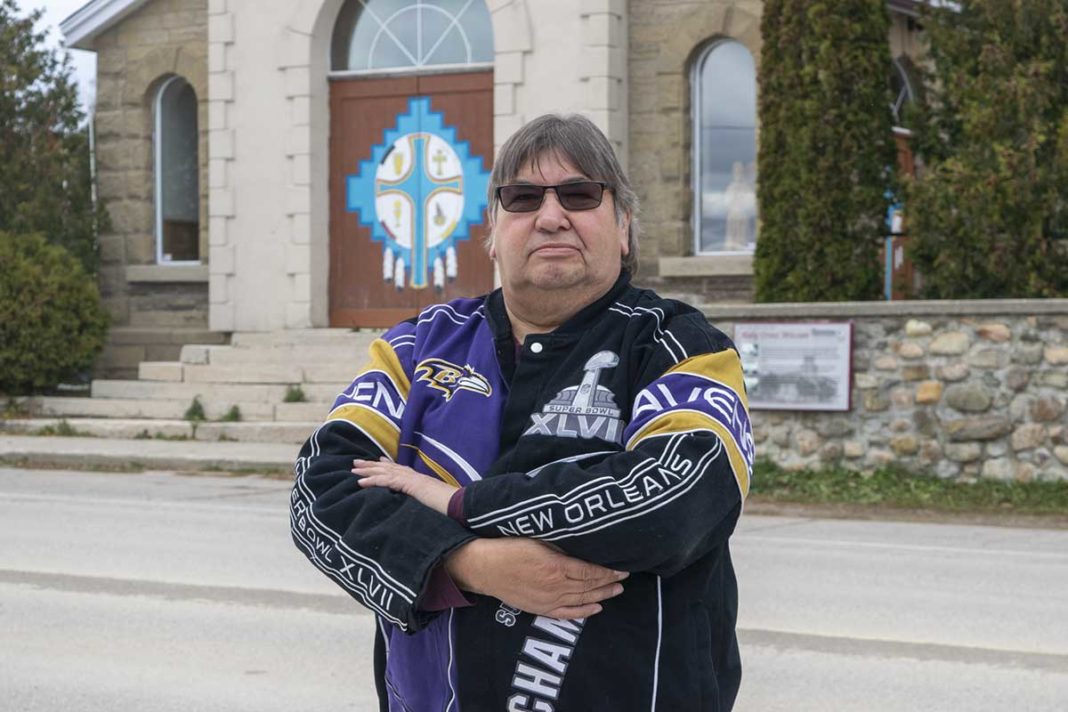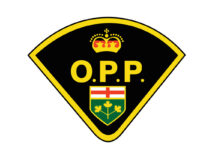EDITOR’S NOTE: The following story contains information about sexual abuse that took place in Wiikwemkoong during the mid-to-late 20th century. This information may be disturbing to those who have suffered from sexual abuse. Support is available 24/7 through the First Nations and Inuit Hope for Wellness Help Line at 1-855-242-3310 or the Manitoulin Family Resources crisis line at 1-800-465-6788.
WIIKWEMKOONG – Mishkee Adzawin Enagadong (Medicine Life Keeper), whose English name is Josh Eshkawkogan, shared a story in last week’s edition of The Manitoulin Expositor of the abuse he suffered as a boy at the hands of Brother Norman Hinton, a Jesuit who served n Wiikwemkoong in 1965 and then from 1966 to 1984. Brother Hinton is named as a sexual abuser in a pending class action alongside a Brother O’Meare and Father George Epoch, who has been named one of Canada’s worst sexual abusers.
Mr. Eshkawkogan has grown from his childhood trauma to become a well-respected elder within his community who performs ceremonies and offers guidance.
He agreed to speak with The Expositor and publicly share his story in the hopes that it may offer strength to others who have lived with similar trauma for decades. Mr. Eshkawkogan invited anyone who may be suffering to contact him for spiritual strength.
In last week’s story, Mr. Eshkawkogan described how he began working in forestry and eventually got married. That marriage ended in divorce and he began experiencing depression.
At that time, he was working near Ignace in Northern Ontario and had turned to alcohol as a temporary coping method for his mental illness. He realized that he needed a change in his life so he visited a seer in Sudbury who told Mr. Eshkawkogan that he needed to reconnect with the Anishinaabe way.
“She told me that I needed to come back to my grass roots level, to be with the elders. That’s when I started my journey to where I am now, for understanding what was my purpose,” said Mr. Eshkawkogan.
He returned to Wiikwemkoong and turned to elders for guidance. Mr. Eshkawkogan attended traditional ceremonies and eventually began to be mentored by an elder to lead ceremonies. He started helping with opening ceremonies and aided in sweat lodges. Before long, Mr. Eshkawkogan became a sweat lodge conductor and a pipe carrier.
But being surrounded by traditional healing was not enough to get him the answers he needed.
“I had all these tools in regards to (ceremonies), but I still didn’t know what the meaning of spirituality was,” said Mr. Eshkawkogan.
It was then that he looked deeper within himself and found a way to heal, even though it was difficult.
“I started realizing that in order to move forward, what I needed to do was realize what took place in my own life stage at that child age. I had to let go of that,” he said.
He began to think of his parents’ internal struggles and what drove them to alcoholism, to their own pain and their eventual separation. While their individual problems certainly impacted Mr. Eshkawkogan’s own life, he had to let them go because they were not his struggles to bear.
“Their mission with me was to bring me into this world and to take care of me until a certain age when I could look after myself,” he said. “I’m pretty sure they did the best that they could do. It’s like that with a lot of families, especially the First Nation communities, there’s always that disconnection within families. But times have changed in regards to helping each other.”
Learning to let go of the past was a powerful gift.
“That was one of the greatest things the Creator gave me, was to understand forgiveness. And to know that in order for me to move forward with that, I had to learn to forgive myself at first,” said Mr. Eshkawkogan. “And to be able to find the truth of me and the truth of what happened … and acknowledging that that’s what happened and it wasn’t (my) fault.”
He said his journey to redemption was difficult and that he understood why other victims may be afraid to acknowledge what happened to them, especially if they did not know the process to find their own answers.
“It’s hard for some of our (community’s) victims to move forward,” said Mr. Eshkawkogan. “You have to start somewhere, and bringing the truth out is the first step of understanding, believing and acknowledging that incident.”
Father Epoch’s body was buried in Wiikwemkoong several years before any of his crimes were ever reported to police. Mr. Eshkawkogan said he feels the grave site offers an opportunity.
“There’s a reason why that person was buried in our cemetery, in our lands, and I think that’s just to keep everything in check in regards to what really happened is true. So, as long as (Father Epoch) is there, the truth will always be opened up. That’s my own perspective with it,” he said.
Mr. Eshkawkogan’s reconciliation process has led him to wonder if the abusers did the same before their deaths.
“Did (Brother Hinton) let go? Did he say sorry for anything before he died? Did he say sorry to himself before he died, or even just to the universe, to say ‘I’m sorry for what I’ve done?’” wondered Mr. Eshkawkogan.
In the past, discussions of the responsibility of these crimes have included blame on the Jesuits and the Diocese of Sault Ste. Marie for employing someone who was allegedly known to have been abusive, as well as the chief and council who allowed these men to practice in their community. Mr. Eshkawkogan said he has moved beyond casting blame and hatred, but that those groups still have an important responsibility in this matter.
“Our people need a little more support,” he said, “at least an acknowledgement that this happened, or this is how they’re going to accept that.”
Mr. Eshkawkogan said he could understand the difficulty of acknowledging past traumatic experiences.
“Sharing a story is sometimes very hard for people that’s gone through traumatization, in regards to their childhood,” he said, adding that he hoped sharing his own experiences might give others the strength to begin their own healing journey.
“I use my bundle to help people with their purpose, to be able to find their own balance, their own method of forgiveness and method of moving on, moving forward,” said Mr. Eshkawkogan. “That was my destiny, I guess, in regards for helping people. Because I had to learn how to help myself.”
Mr. Eshkawkogan encouraged anyone who has been affected by the Jesuits named in the current lawsuit to reach out to an elder, such as himself, to begin seeking spiritual guidance.
“A lot of people still need help and that’s my purpose, to do that. How you help is by giving empowerment to the people that are going through that emotional, mental stress, to give them the empowerment that they can change that. That’s a gift that was presented to me by my pipe,” he said.
Although some community members are reluctant to acknowledge that the problem exists, Mr. Eshkawkogan said he wished strength and courage for everyone affected by these individuals.
“I’m hoping my brothers and sisters will be able to open up their minds in regards for the knowledge that they carry within from their own incident, and to be able to share that in a good way so they can start healing, because it’s a slow process,” he said.
•••
The Expositor will be following the new developments in this case as more information becomes available, as well as sharing stories and past records that bring context to the crimes of Father George Epoch, Brother Norman Hinton and Brother O’Meare from their time in Wiikwemkoong.





